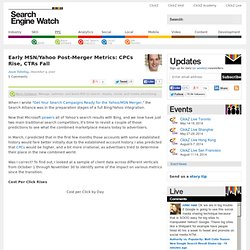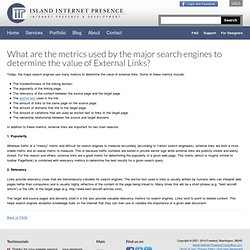

Early MSN/Yahoo Post-Merger Metrics: CPCs Rise, CTRs Fall. When I wrote "Get Your Search Campaigns Ready for the Yahoo/MSN Merger," the Search Alliance was in the preparation stages of a full Bing/Yahoo integration.

Now that Microsoft powers all of Yahoo's search results with Bing, and we now have just two main traditional search competitors, it's time to revisit a couple of those predictions to see what the combined marketplace means today to advertisers. In March, I predicted that in the first few months those accounts with some established history would fare better initially due to the established account history. I also predicted that CPCs would be higher, and a bit more irrational, as advertisers tried to determine their place in the new combined world. Was I correct? To find out, I looked at a sample of client data across different verticals from October 1 through November 30 to identify some of the impact on various metrics since the transition.
Cost Per Click Rises Click-Through Rate Drops Future Outlook. What are the metrics used by the major search engines to determine the value of External Links? Today, the major search engines use many metrics to determine the value of external links.

Some of these metrics include: The trustworthiness of the linking domain. The popularity of the linking page. The relevancy of the content between the source page and the target page. The anchor text used in the link. In addition to these metrics, external links are important for two main reasons: 1. Whereas traffic is a "messy" metric and difficult for search engines to measure accurately (according to Yahoo! 2. Links provide relevancy clues that are tremendously valuable for search engines. The target and source pages and domains cited in a link also provide valuable relevancy metrics for search engines. Measuring & Tracking Success of your SEO Strategy - The Beginners Guide to SEO. They say that if you can measure it, then you can improve it.
In search engine optimization, measurement is critical to success. Professional SEOs track data about rankings, referrals, links and more to help analyze their SEO strategy and create road maps for success. Although every business is unique and every website has different metrics that matter, the following list is nearly universal. Note that we're only covering those metrics critical to SEO - optimizing for the search engines. 5 Critical Search Engine Metrics That You Should Be Tracking. This keyword combo from Google is one I've been optimizing...
[This is part of the The Blogger’s Essential Guide to Search Engine Optimization Series.] You could optimize your blog with search engine optimization strategies til kingdom come but it won’t matter much unless you know if it’s actually working. Why? Search Engine Metrics... Organic Search vs. Paid Placement. Search Engine Metrics...

Organic Search vs. Paid Placement ¿by: Lawrence Deon. SEO Metrics: How Can Search Engine Optimization Results Be Measured? PageRank, keyword position in SERPs, website traffic, conversions, customers in the door… Just how do you measure the results of SEO or search marketing?

Which metrics to use and why, like most things in internet marketing, is the subject of much debate and a source of confusion for many. SearchEngineMetrics. The Effectiveness of Web Search Engines to Index New Sites from Different Countries. Ari Pirkola Department of Information Studies, University of Tampere, 33014 Tampere, Finland Introduction Currently the World Wide Web contains billions of publicly available pages.

Besides its huge size, the Web is characterized by its rapid growth and rate of change. A vast number of new sites and pages are created every day. As more information becomes available on the Web it is more difficult to provide effective search services for Internet users. Proportionally smaller coverage of certain types of Websites in search engines, for example, sites of certain countries, results in the decreased visibility of those sites on the Web. An individual or organization publishing a Website has to acquire a domain name for the site, a unique alphabetical address, e.g. www.microsoft.com has to register it. For each of the three countries, recently registered domain names were taken from domain name sources (e.g. the Ficora domain name registry). Related Work Methods and data.